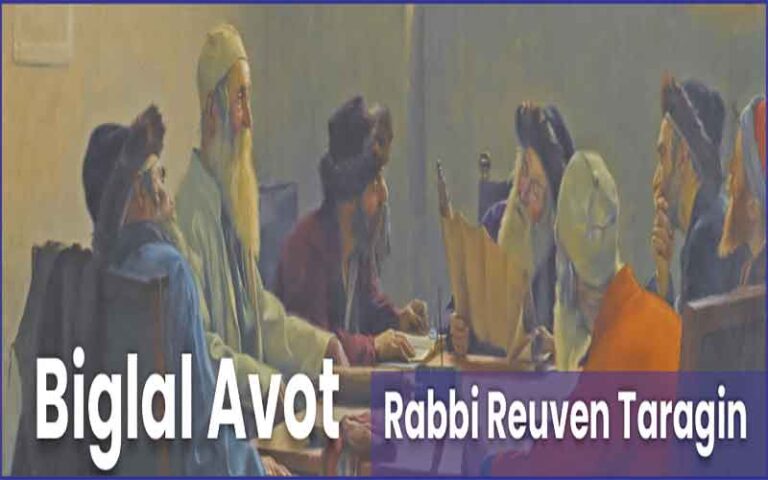LâTov Lanu
Moshe Rabbeinu uses his last words, eternalized by Sefer Devarim, to encourage the Jewish people to continue following Hashem and observing His mitzvot after his death. In Parshat Eikev, he minimizes Hashem’s ask of the Jewish people: âAnd now, what does Hashem ask from you? Merely to fear Hashem, your G-d (Devarim 10:12).â
The Gemara (Berachot 33b) asks the obvious question. How could Moshe present fear of G-d as a small thing? People spend their whole lives trying to achieve it and still find it elusive.
We can add a second question. After mentioning yirat shamayim, Moshe lists many other requests: following Hashemâs path, loving Him, serving Him with all our heart and soul, and observing His mitzvot and chukim. Even if fear of G-d was a small thing, how could Moshe present this entire list as a small ask?
To answer these questions, Tosafot (Daâat Zekeinim, Devarim 10:12) and the Ramban (ibid.) focus on Moshe’s last two words. After listing Hashem’s requests, Moshe adds the words âlâtov lach, for your own good.â Hashem indeed asks for many things, and a life committed to Torah and mitzvot is indeed rigorous and detailed, but all of it, including the seemingly mysterious chukim, has intrinsic value for us. We should not see His requests as burdensome because they are all for our sake.
Hashem made this point to Avraham Avinu when He gave him his first mitzvah â the mitzvah of brit milah. Hashem told Avraham that milah would make him âtamim, complete (Bereishit 17:1).â Though the mitzvah required him to circumcise part of his body, the removal completed him.
Moshe Rabbeinu made the same point regarding all the mitzvot. Though we should observe mitzvot because Hashem commands us to, our fulfillment also benefits us. Mitzvah observance is not just a duty but a privilege. This is why Yirmiyahu HaNavi (2:19) describes the abandonment of avodat Hashem as âra vaâmar (bad and bitter).â It is bad because it constitutes rebellion against Hashem; it is bitter because one forfeits the benefits intrinsic to mitzvah fulfillment.
He Knows Whatâs Best For Us
Though we fulfill mitzvot for Hashemâs sake, He does not need our fulfillment, and it does not help or contribute to His existence in any way. The medrash (BâR 44:1) gives the mitzvah of shechita (ritual slaughter) as an example of this idea. âDoes Hashem care which side of the neck we slaughter? Does the shechita affect or assist Him? Clearly, the mitzvot are for our sake â to refine and purify us, not for Hashemâs benefit.â
Rebbe Chanaya ben Akashya famously makes this point regarding the multitude of mitzvot we are commanded to observe. Anticipating one viewing the long list of mitzvot as onerous, Rebbe Chananya explains that they are actually all gifts from Hashem. âRatzah Hakadosh Baruch Hu lâzakot et Yisrael. Lâfichach hirba laâhem Torah uâmitzvot (Makkot 23b).â Hashem enlarged the amount of Torah and mitzvot in order to grant us more beneficial opportunities.
The Ramban understood the benefit of mitzvah fulfillment as the message of the famous pasuk that links life to mitzvah observance: âUâshmartem et chukotai⦠vaâchai baâhem (Vayikra 18:5).â Chazal derived the concept of pikuach nefesh from this pasuk: we do not sacrifice our lives to observe (most) mitzvot. The Ramban added a second lesson. Not only do mitzvot not supersede life, they also help us live life and build society properly.
The Rambanâs talmid, who authored the Sefer HaChinuch, builds on this idea and applies it to many mitzvot, which he explains are âfor the good of Hashemâs creations.â Hashem created us and, therefore, cares about our welfare and knows what contributes to it. This is why He commanded us to recite brachot (which facilitate His blessings to us) (430) and confess sins (which helps us distance ourselves from them) (364), prohibited sacrificing kodshim outside of the Mikdash (which reinforces murderous tendencies) (186), and repeated important prohibitions (so we would know to be cautious about their fulfillment) (362).
Wise Advice
The Rambam also emphasizes the benefits mitzvot offer. Appreciative of their salubrity, the Rambam (Temurah 4:13) describes mitzvot as âadviceâ from the âgreat advisorâ meant to help us improve ourselves. Though mitzvot are commandments incumbent upon us to observe, the Rambam portrays them as Hashemâs âadviceâ because the path they chart is also the best way to live.
Interestingly, the Rambam characterizes all mitzvot, even chukim (mitzvot whose reasons are unknown to us), as advice. One might have understood chukim differently. Though it is natural to see mishpatim, mitzvot whose reasons are known, as meant for our benefit, chukim could be seen as merely a way of showing our commitment to Hashemâs Will. The Rambam felt otherwise. Though we do not know how or why Hashem mandated chukim, we believe they also benefit us.
This is why the Torah mentions chukim first in the (aforementioned) pasuk that characterizes mitzvot as facilitating life: âUâshmartem et chukotai vâet mishpatai asher yaâaseh otam haâadam vaâchai baâhem (Vayikra 18:5).â We might have assumed that only mishpatim facilitate a better life. By putting chukim first, the pasuk emphasizes that chukim do so as well.
The Rambam (MâN 3:31) proves this point from the Torahâs assertion that other nations will see our âchukim and mishpatimâ as âwise,â âbright,â and âjust,â and, therefore, us Jews as a âwise and brightâ people (Devarim 4:6-8). The pasuk mentions chukim specifically to teach us that they, too, have deep meaning and contribute to our growth.
In Pirkei Avot (2:1), Rebbe Yehudah HaNasi encourages us to consider the cost-benefit ratio of mitzvah fulfillment. Moshe Rabbeinuâs words add an essential dimension to this consideration: mitzvah observance offers not only heavenly rewards but also worldly benefits.
May appreciating this inspire us to passionately pursue mitzvot fulfillment.


